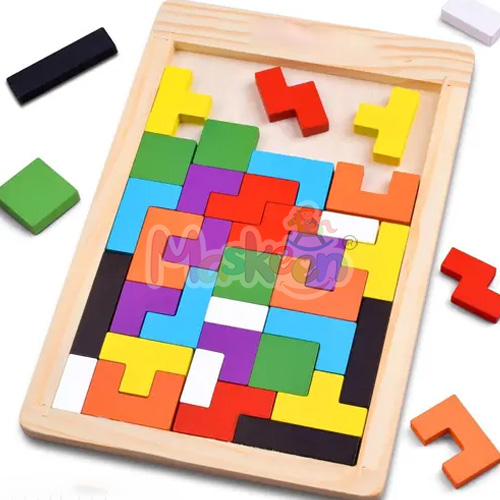- Toys
- Soft Play Equipment
- Trampoline
- School Furniture
- Exhibitions
- Achievements
- New Arrivals
- About Us

Early childhood really is a time of learning and discovery; anything that a child interacts with at that time influences how he thinks, how he feels, and how he grows. A Play School Wooden Puzzle acting as a source of fun and a silent powerhouse of learning. Usually, being an instrument of Learning under the hand of a teacher and a toy under the hands of Fun, such puzzles provide an ideal mix of both. Continuous exposure to such puzzles enhances skills instead of merely adding knowledge-patience, concentration, and perseverance are skills to be developed for future learning.
The best part of puzzle enjoyment is how it trains the brain. For instance, when children bring pieces together, they do trial and error, recognize patterns, and apply logical thinking—all of which develop fundamental problem-solving skills and sharpen memory and attention span. Even a simple wooden puzzle of simple shapes provokes forward-thinking and trial of hypotheses—the very skills later useful in school and in real life. Completing a puzzle shapes self-confidence and, therefore, encourages taking on more complex challenges.
All this movement involves small puzzle pieces which children must hold, pinch, rotate, and join objects with very high precision. Hence, this activity complements fine motor control and hand-eye coordination developed through repetitive actions important in writing, cutting, and buttoning. This would also bring a bit more experience of having a special Kids Table by Maskeen Toys Pvt. Ltd.. Additionally, this product fosters more concentration and promotes solitary play.
Puzzles provide great opportunities for development of language skills, especially in a group activity setting. As children learn to describe what they are doing, ask for help, or tell others what they think about their puzzles, they develop vocabulary and learn how to form sentences. Such care or educators when interacting with the child while playing with a puzzle—e.g., asking a question during play or naming shapes, animals, or letters—will make that moment feel similar to playing with language that enriches the experience. It would enhance verbal skills, but also listening and comprehension skills.
Usually, putting together a puzzle is not easy, usually for younger children. It casts lots of tries and failures to eventually reach a resolution, which teaches endurance, resilience, and manages frustration-all part of your crusade towards the healthy emotional cause. Puzzle-solving quiets the mind and fosters intense concentration, much like the soothing qualities of Indoor Swings in a playroom. So gentleness of swinging has been shown to regulate emotional disturbance and anxiety, then puzzle play offers the meditative space where the children can pause, think, and recenter themselves.
Understanding how different shapes fit together enhances spatial awareness, which is not only essential in academics, most importantly in geometry and reading, but also in navigating environments out there in reality. As children manipulate the pieces and investigate their size, orientation, and how they relate to each other, they develop critical visual-spatial reasoning. Wooden puzzles with luminous colors and themes, such as animals, numbers, or the alphabet, also favor visual recognition and early categorization skills, which in turn are essential to logical thinking and success in academic terms.
A solo activity, puzzles are also an example of many people sitting together to work on something. Sharing space within a group of kids for working together on a puzzle teaches them about sharing space, negotiating roles, and communicating together—all team skills and the most fundamental social skills to learn. Many have Outdoor Swings in their play areas to help with all this, as they, too, capture that juncture where children further engage socially as they take turns or push each other. Whether at the puzzle or on the playground, children are learning how to interact, empathize, and cooperate.
Indeed, it is much wordy to say that a wooden puzzle from a play school is worth far more than its simple visage. The puzzle becomes many things- developing cognitive strength, resilience from an emotional standpoint, muscle control, or even gaining social confidence. If you visualize the pieces fitting into a larger image, it suggests that playing in such focused moments nurtures the entire child when such moments are supported by caring environments devised with socialization or perhaps engaging elements-developmentally appropriate kids' tables or even the more calming options of indoor and outdoor swinging.